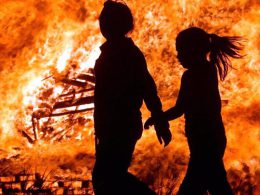By Manus Lenihan
On Friday we learned with great sadness of the death at age 55 of Manchán Magan, adventurer, documentary filmmaker, writer, environmentalist and probably the foremost advocate for the Irish language in recent years.
Magan was well-known as a TV presenter and author long before his profile grew in the 2020s with the publication of books such as Thirty-Two Words for Field and Listen to the Land Speak. Magan made a case for the Irish language as a different and exciting lens through which to see the world. He excelled in explaining brilliant, delightful, funny or just oddly specific words and phrases, and drawing out their multiple, often nested meanings. In this he displayed an incredible depth of knowledge and immersion. These insights would have been common knowledge only a few generations ago, underlining the importance of the work Magan did to bring them back into the light.
Irish carries a wealth of understanding about the natural world which is valuable for today’s environmental movements. For example, he wrote that one word helped convince him to become a vegan. That word was diadhánach, which he explains as the particular lowing of a cow, expressing grief after she is separated from her calf for purposes of milking. Magan was a dedicated environmentalist (he even built his own low-carbon home out of straw bales) and this shines through constantly in his work.
Whether in his writings or on the screen or in podcast interviews, Magan advanced interesting and radical ideas. He argued that Irish is a language in which reality is mutable and capricious, in which worlds collide; it reminds us to view the world in all its dialectical richness and contradiction.
For some people, language and culture and spiritual beliefs are little more than a way to exclude those who (it is claimed) do not share them. Right now racism and violence are on the rise in Ireland. Manchán Magan showed us that truly loving one’s own culture does not mean hatred for others. On the contrary, his fascination with Irish was one component of his general fascination with the human race and its diverse cultures and languages. His writings dwelt for entire chapters on the strange parallels between Irish and other far-flung Indo-European languages – and even languages such as Arabic which have no common ancestor with Irish. His book on the similiarities between the cultures and languages of Ireland and India was greeted with great interest in Ireland’s growing Indian community.
This is a premature and extremely sad loss. It is certain that Manchán Magan’s rich contribution will be celebrated, appreciated and delighted in for generations to come.










